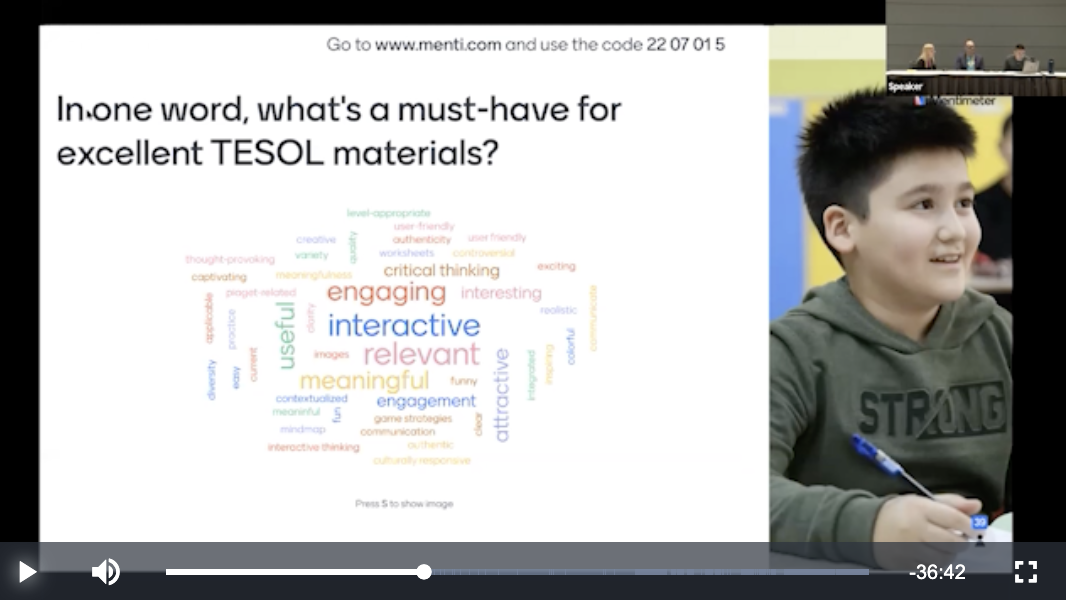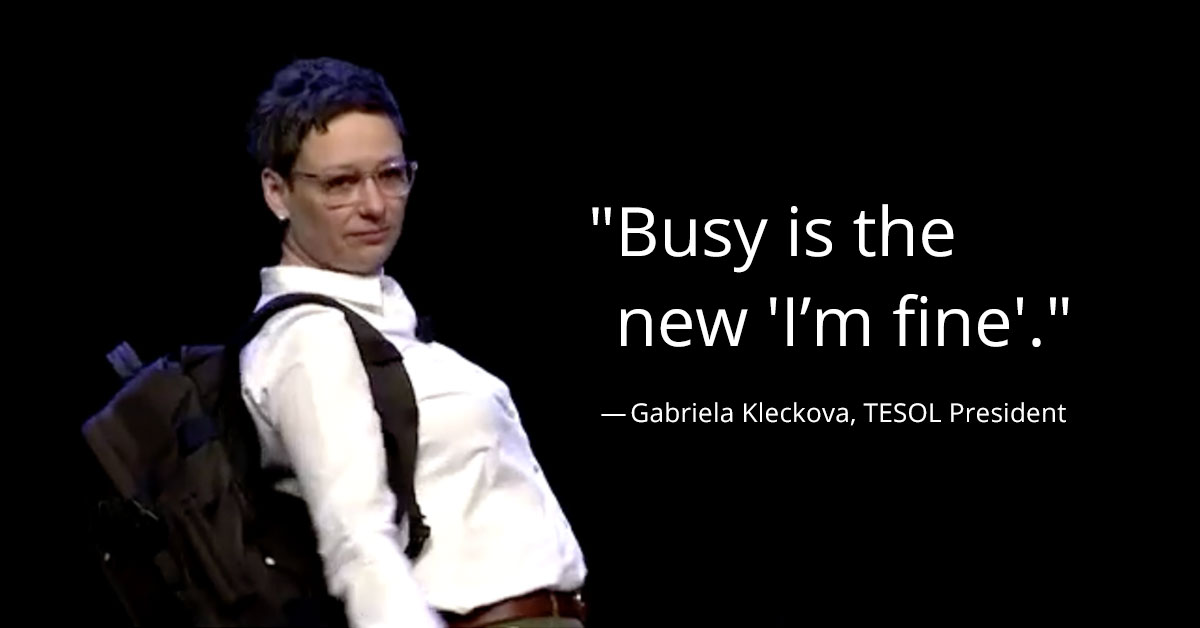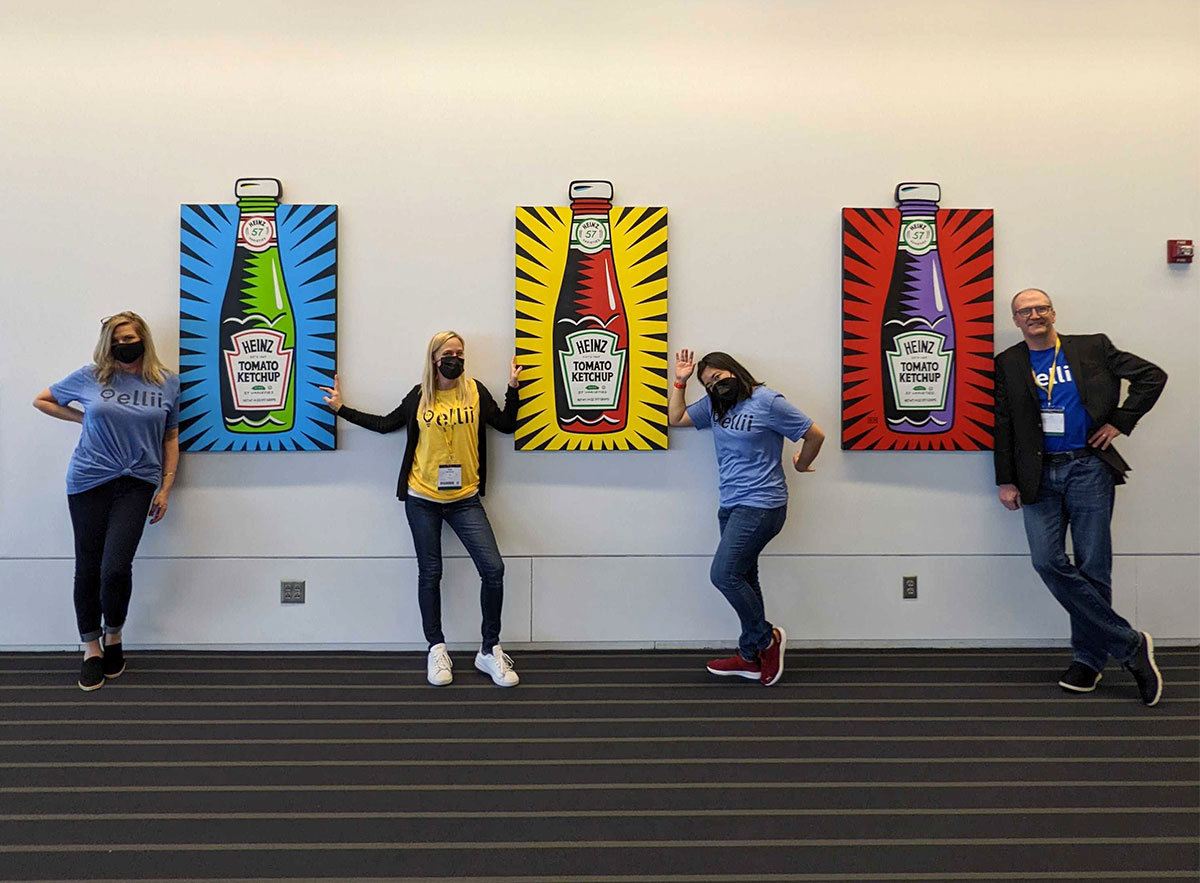Share this post
I've just returned from TESOL 2022 in Pittsburgh, Pennsylvania, and it's time for my annual TESOL conference takeaways.
Though attending the convention in person was an option this year (most attended virtually), I could not bear to miss our 20th anniversary—the year we rolled out the white carpet as a Platinum Sponsor and officially became Ellii!

The TESOL 2022 Ellii Team (left to right): Ben Buckwold (Founder/CEO), Tammy Wik (Director of Outreach), Lei Kayanuma (Group Accounts Specialist), Mari Lasnetski (Chief Impact Officer), Tara Benwell (VP of Publishing), Ken Volcjak (Director of Partnerships) on the comfy, white carpet that we became famous for at this year's event.
In the spirit of less is more this year, I've lightened the load from my traditional 10 TESOL takeaways to just seven points to unpack!
- Hybrid Hurts
- Coffee Chats Are Inclusive
- SEL Is on Overload
- The Simplest Tools Are the Best
- Cell Phones Are
WelcomeMandatory - Teachers Are Advocates
- The World Needs More Stories
1. Hybrid Hurts
If there was one common pain point shared by teachers this year, it was a thumbs down for hybrid learning.
While the hybrid approach gave students the option of learning at home or in person during the pandemic, teachers at TESOL described the frustration of feeling like they couldn't service either group effectively, especially at the lowest levels.
In contrast, many teachers described significant gains their students had during periods of fully remote learning.
One teacher suggested that one week of virtual class before moving to in-class should be kept as a permanent solution. This allows everyone to get set up on a learning management system (LMS) with a Zoom link that can be reused during lockdowns or bad weather days.
The TESOL conference itself was hybrid this year, and many speakers and attendees expressed similar concerns about the experience. People at home felt left out of the conversation, while speakers had difficulty engaging with both a live and remote audience.
This year, the Ellii team tried to accommodate both groups by hosting in-person and virtual sessions. While many of the sessions were successful, we still learned a few tricks that would help improve the experience for virtual attendees next time around.
2. Coffee Chats Are Inclusive
TESOL is well-known now for its informal Coffee Chats, and Ellii was pleased to be invited to one this year.
It was refreshing to hear our host, Diego, encourage everyone to use plain language. In an industry full of acronyms and academics with teachers from a wide range of programs and nations, a discussion about teaching can sometimes feel like a foreign language itself.

TESOL Coffee Chat with Ellii session.
During this hybrid session, we talked about 5 must-haves for English language teaching (ELT) materials. The remote audience felt included as they pinned themselves on a map, participated in surveys, and shared ideas in the chat about the importance of relevancy, design, and inclusivity in materials.
A speaker from the live audience came to the podium to ask a question, and a speaker from the chat went on video. We also had follow-up discussions after the chat.
Hybrid isn't so bad after all (if you have your own host and tech team)!
3. SEL Is on Overload
Social-emotional learning (SEL) was another common topic of discussion at TESOL this year.
From wordless books to mindfulness and meditation, ideas for emotional wellness and self-care were shared in almost every session.
However, one couldn't help but notice the whispers from the audience (or tweets from the virtual attendees).
Many teachers feel that SEL is just one more thing to carry in their overloaded backpacks. Do they care about their students' well-being and emotional health? Of course! Do they want to record how many affirmations they hand out each week or which SEL standards they meet? Not if it's for a free doughnut or permission to wear jeans.

Gabriela Kleckova, TESOL President.
4. The Simplest Tools Are the Best
Teaching conferences and exhibit halls are always full of exciting trends and tech (at the booth, we were excited to show off Immersive Reader, which is coming soon to Ellii). But teachers themselves often get the most delight in learning about the simplest tools.
In their session, "Practice More, Prep Less: Quick Ideas that Generate Life-Long Skills," Cheryl Bucholtz-Magallon and Esther Lee shared the spinning wheel they use to randomize topics or student selection. They also shared a simple online buzzer for their most competitive practice activities.
In her teaching tip session, "The Power of Practice: Systematized Fluency Activities Which Build Community," Elka Kristonagy, English Language Program Lector at Yale University, described some basic, yet powerful ways to use Google Docs in hybrid classes for those who don't have an LMS, including using Google Forms for formative assessment and comments for collaborative work.
Meanwhile, keynote speaker Helaine W. Marshall shared how a colleague taught an entire Level 1 class using WhatsApp.

The Ellii team taking a break to strike a pose with art by Pittsburgh artist Andy Warhol.
5. Cell Phones Are Welcome Mandatory
One big change I noticed at TESOL this year was a shift in cell phone use in the classroom.
Instead of policing their use, teachers are embracing and even relying on cell phones.
During the session "Should it Stay or Should it Go? Post-Pandemic Takeaways," a group of teachers from New York's Nassau Community College talked about this cultural shift.
They now rely on students to use their own data when the Wi-Fi goes down.
Students use cell phones for all sorts of resources, from looking up words to taking quizzes and accessing interactive activities with QR codes (not to mention confirming they don't have COVID-19 or requesting a washroom pass).
Personally, I didn't bother dragging my laptop around at TESOL this year. I took all my session notes on my phone (and brought home an empty paper notebook). Next year, I may lighten my load even more and not bother bringing a computer.
6. Teachers Are Advocates
In that same post-pandemic takeaways session, the speakers described how they advocated for 6 out of 20 of their in-class hours to be switched to asynchronous learning.
This resulted in students becoming more independent learners (with the help of Ellii, I was happy to hear).
The most popular session I attended at this year's conference was "6 Strategies for Serving SLIFE" (Students with Limited or Interrupted Formal Education).
During this session, Beth Evans (@TofuBeth) described how a 12-year-old SLIFE student did not qualify for a bus pass because he didn't live 1.6 miles from school. When she learned that her Level 1 youngster had to cross several busy lanes of traffic and railroad tracks to reach the school, she knew she had to advocate for special arrangements to be made.
"I don’t have all the answers but I have a big voice."
—Beth Evans
To advocate for our students, we need to get to know them on a personal level. And even more importantly, SLIFE especially must know and trust their teachers in order to learn from them.
As one teacher mentioned, bringing Zoom into the room has actually helped humanize the teacher who has real-life interruptions like pets, and children, and mail deliveries.
7. The World Needs More Stories
After sharing a tear about the boy and the bus pass, we shared a giggle about a group of SLIFE students in Ohio who threw their winter coats in the trash after their first winter, thinking "phew, that's over!"
The thing I love most in life is stories. So, naturally what I love most about TESOL is the stories we hear and tell in a setting that's new every year. (Not to mention the characters we meet!)
At the beginning of the final keynote this year, Helaine W. Marshall showed a picture of her kitchen. She explained that she didn't want an island in her kitchen when she renovated it because she loves to dance. An island would have stunted her creativity.
After she told us three stories of teachers who were creating fertile spaces in their work lives, she asked us all to think about what islands might be standing in our way. It's stories like these that inspire us to create new chapters in our lives and in the lives of our students. Get plotting!

What's the story here? See Emly Bryson's post about how one image can develop visual literacy and critical thinking skills.
See you next year in Portland, Oregon (home of the best bookstore I've ever explored)!
Share Your Thoughts
What was your top takeaway from TESOL 2022? And if you didn't attend, what are your thoughts about hybrid teaching and learning? Let me know in the comments below. I'd love to hear your thoughts!
Presentation Links
If you registered for TESOL, you can watch some of the recorded sessions mentioned in this post:
- Embracing the Balancing Act: ELT Professionals Empowering Themselves: Gabriela Kleckova
- Coffee Chat with Ellii: What Are 5 Must-Haves for ESL Materials?: Diego Boada, Ben Buckwold, Tara Benwell
- SEL with Ellii: Tammy Wik
- Creating Fertile Spaces for Instructional Innovation in a Digital Age: Helaine W. Marshall
- Invisible Immigrant to Advocate: Gisele Barreto Fetterman
- 6 Strategies for Serving SLIFE (presentation slides)
Comments
There are no comments on this post. Start the conversation!

